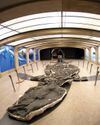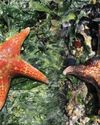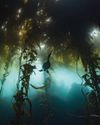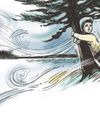
BLUENOSE’S MAIDEN FISHING TRIP nearly ended before it began. It was nighttime in the spring of 1921, and the ship’s crew had just finished their first-day catching cod on the Grand Banks off Newfoundland. At around 2 a.m., to the horror of Captain Angus J. Walters, the watch shouted an alarm: a huge wooden schooner was careening out of the blowing, inky darkness toward their smaller ship. The “free-cussing” Walters ordered the crew overboard in small fishing dories while the watch frantically blew the foghorn. At the very last moment, the oncoming vessel sheared away. “What actually put her clear of us, that she did not cut us in two, is more than I can say,” Walters later said. “That full-rigged ship just cleared us by inches.”
It was a close call — the first of many — in a legacy that, for many Canadians, is gilt with triumph. But like most symbols fated for coins, Heritage Minutes and licence plates, the true story of Bluenose is more complicated. In its lifetime, the ship was a sure-shot, a shipwreck, a phoenix rising from the ashes. Yet even now, in today’s perilous historical moment, Bluenose contains another tale, one with eerie echoes from the past and hopeful, cautionary lessons for the future.
The era in which Bluenose was built was “a time fraught with distressing things,” says HeatherAnne Getson, former historian at the Fisheries Museum of the Atlantic, in Lunenburg, N.S., and author of the book Bluenose: The Ocean Knows Her Name. Communities around the world had been devastated by the human and economic losses of the First World War, which, in a cruel twist, had been followed by the illness and death of millions in the Spanish flu pandemic.
This story is from the {{IssueName}} edition of {{MagazineName}}.
Start your 7-day Magzter GOLD free trial to access thousands of curated premium stories, and 9,000+ magazines and newspapers.
Already a subscriber ? Sign In
This story is from the {{IssueName}} edition of {{MagazineName}}.
Start your 7-day Magzter GOLD free trial to access thousands of curated premium stories, and 9,000+ magazines and newspapers.
Already a subscriber? Sign In

ANIMAL XING
THIS PAST SUMMER AN AMBITIOUS WILDLIFE UNDER/OVERPASS SYSTEM BROKE GROUND IN B.C. ON A DEADLY STRETCH OF HIGHWAY JUST WEST OF THE ALBERTA BORDER. HERE’S HOW IT HAPPENED.

Unearthing a giant
Almost 30 years ago, paleontologist Elizabeth “Betsy” Nicholls made a discovery of colossal proportions

WE DID THIS
AS THE IMPACTS OF GLOBAL WARMING BECOME INCREASINGLY EVIDENT, THE CONNECTIONS TO BIODIVERSITY LOSS ARE HARD TO IGNORE. CAN THIS FALL’S TWO KEY INTERNATIONAL CONFERENCES POINT US TO A NATURE-POSITIVE FUTURE?

The COOLEST COUNTRY
“The coolest country” celebrates the wonders of winter with an all-Canadian theme. The 20-page travel planner includes a bucket list from travel writer Robin Esrock, steamy spa ideas, ice fishing destinations, festival fun, northern itineraries and more!

KEEPER of the SEA
FROM BEING LABELLED DEVIL’S APRON BY FRUSTRATED FISHERMEN TO BEING LAUDED AS A SUSTAINABLE FOOD SOLUTION: HOW KELP’S POTENTIAL IS BEING REALIZED, JUST AS SCIENTISTS LEARN IT’S DECLINING

WILD THINGS
WILD CANADIAN GEOGRAPHIC PRESENTS THE WINNERS OF ITS ANNUAL CANADIAN WILDLIFE PHOTOGRAPHY OF THE YEAR COMPETITION

AN EMPTY LANDSCAPE
AFTER MORE THAN A MILLION YEARS ON EARTH, CARIBOU ARE UNDER THREAT OF GLOBAL EXTINCTION. THE PRECIPITOUS DECLINE OF THE ONCE MIGHTY HERDS IS A TRAGEDY THAT IS HARD TO WATCH — AND EVEN HARDER TO REVERSE.

NORTHERN EXPOSURE
BON INTO A CARIBOU-HUNTING CREE FAMILY IN NORTHERN MANITOBA, ACCLAIMED PLAYWRIGHT AND NOVELIST. TOMSON HIGHWAYS PAYS TRIBUTE TO THE MAGICAL WORLD OF HIS CHILDHOOD IN PERMANENT ASTONISHMENT

INTO THE ARCTIC
CANADIAN PAINTER AND FILMMAKER CORY TRÉPANIER EXPLORES THE SUBLIME AND RAPIDLY CHANGING CANADIAN ARCTIC

Under the ice
Until the last decade, we knew little about what lay beneath the Arctic ice. Now scientists and explorers are shedding light on this vanishing world.